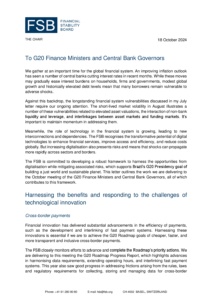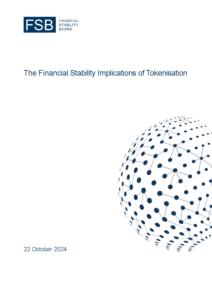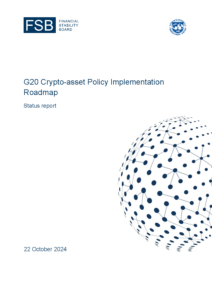Press enquiries:
+41 61 280 8477
[email protected]
Ref: 23/2024
- FSB Chair calls for continued momentum in addressing longstanding financial system vulnerabilities related to elevated debt levels and asset valuations, non-bank liquidity and leverage, and asset and funding market interlinkages.
- Accompanying report on tokenisation finds low adoption in the financial sector to date, but warns that financial stability risks could rise if tokenisation scales up significantly and if identified vulnerabilities are not adequately addressed.
- Jurisdictions have made progress in implementing the policy and regulatory responses to address the risks of crypto-assets, developed by the IMF, FSB, and standard-setting bodies (SSBs), but challenges remain.
The Financial Stability Board (FSB) today published a letter from its Chair, Klaas Knot, to G20 Finance Ministers and Central Bank Governors, ahead of their meeting on 23-24 October.
Fears over the global economic outlook are easing, with a number of central banks cutting interest rates. The letter warns of vulnerabilities associated with high debt levels and asset prices, the interaction of non-bank liquidity and leverage, and the connections between different asset and funding markets, illustrated by the short-lived market volatility in August.
The letter outlines the work the FSB has undertaken on financial innovation, payments systems, and cyber and operational resilience. It also introduces the reports the FSB is submitting to the G20 addressing these issues, including:
- The financial stability implications of tokenisation. Tokenisation of assets may have the potential to improve efficiencies and provide access to new markets for investors, but it can also amplify many of the vulnerabilities seen in traditional finance. The FSB report focuses on tokenisation based on distributed ledger technology (DLT), which is the technology used in most tokenisation initiatives. The limited publicly available data on tokenisation suggests that its adoption is still very low but appears to be growing. As such, tokenisation could have implications for financial stability if it scales up significantly, is used to create complex and opaque automated trading products, or if identified vulnerabilities are not adequately addressed through oversight, regulation, supervision, and enforcement. The report sets out some considerations for authorities and international bodies, including ways to address data and information gaps and to increase understanding of how tokenisation and its related features fit into legal and regulatory frameworks and supervisory approaches.
- The status report on the G20 Crypto-Asset Policy Implementation Roadmap. Jurisdictions have made progress implementing the policy and regulatory responses to crypto-assets developed by the IMF, FSB, and standard-setting bodies (SSBs). The report flags some implementation challenges related to the lack of comprehensive regulation of crypto-asset issuers and service providers; cross-border issues, particularly with respect to offshore jurisdictions; and the lack of specific stablecoin regulatory requirements. The report calls on authorities to advance the implementation of the FSB’s crypto-asset framework, globally. It warns that the prevalence of non-compliance with existing laws and regulations significantly undermines these efforts to implement the FSB framework. Additionally, if risks from cross-border crypto-asset activities in offshore jurisdictions increase, international organisations, SSBs and jurisdictional authorities may need to consider additional tools to promote implementation beyond G20 members.
Other reports being delivered to the G20 meeting include a consultation on a common Format for Incident Reporting Exchange (FIRE); progress reports on the G20 Cross-Border Payments Roadmap and associated indicators, which capture key aspects of the user experience; and a report on depositor behaviour and interest rate and liquidity risks in the financial system, drawing on lessons from the March 2023 banking turmoil.
The letter underlines the critical importance of effective and timely implementation of agreed policies and standards in the interest of global financial stability.
Notes to editors
The FSB report defines “tokenisation” as a process that involves utilising new technologies, such as distributed ledger technology, to issue or represent assets in digital forms known as tokens. The report focuses on tokenisation involving financial assets.
In September 2023, the G20 Leaders endorsed the Crypto-Asset Policy Implementation Roadmap, which is included in the IMF-FSB Synthesis Paper: Policies for Crypto-Assets and lays out both planned and ongoing initiatives by the IMF, the FSB, and relevant SSBs.
The FSB coordinates at the international level the work of national financial authorities and international standard-setting bodies and develops and promotes the implementation of effective regulatory, supervisory, and other financial sector policies in the interest of financial stability. It brings together national authorities responsible for financial stability in 24 countries and jurisdictions, international financial institutions, sector-specific international groupings of regulators and supervisors, and committees of central bank experts. The FSB also conducts outreach with approximately 70 other jurisdictions through its six Regional Consultative Groups.
The FSB is chaired by Klaas Knot, President of De Nederlandsche Bank. The FSB Secretariat is located in Basel, Switzerland and hosted by the Bank for International Settlements.


